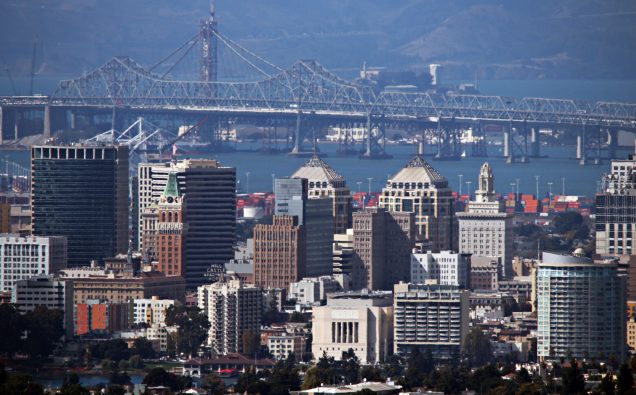
Oakland, California, Photo: Basil D Soufi/Wikimedia Commons
A decade after the global financial crisis, the prospects for a sustained economic recovery remain at risk due to a widespread failure on the part of leaders and policy-makers to put in place reforms necessary to underpin competitiveness and bring about much-needed increases in productivity, the World Economic Forum’s Global Competitiveness Report 2017-2018 says.
The report’s Global Competitiveness Index assigns the United States second spot on its list and Switzerland on top of the list for the ninth successive year.
Several G20 economies make it to the top 10 are Germany (5), the United Kingdom (8) and Japan (9). China is the highest ranking among the BRICS group of large emerging markets, moving up one rank to 27.
An analysis of data over the last 10 years, the report points out three areas of greatest concern. These include the financial system, where levels of “soundness” have yet to recover from the shock of 2007 and in some parts of the world are declining further. This is especially of concern given the important role the financial system will need to play in facilitating investment in innovation related to the Fourth Industrial Revolution.
“Another key finding is that competitiveness is enhanced, not weakened, by combining degrees of flexibility within the labor force with adequate protection of workers’ rights. With vast numbers of jobs set to be disrupted as a result of automation and robotization, creating conditions that can withstand economic shock and support workers through transition periods will be vital,” the Geneva-based Forum said in a statement.
The data suggests determines that the reason innovation often fails to ignite productivity is due to an imbalance between investments in technology and efforts to promote its adoption throughout the wider economy.
“Global competitiveness will be more and more defined by the innovative capacity of a country. Talents will become increasingly more important than capital and therefore the world is moving from the age of capitalism into the age of talentism. Countries preparing for the Fourth Industrial Revolution and simultaneously strengthening their political, economic and social systems will be the winners in the competitive race of the future,” said Klaus Schwab, Founder and Executive Chairman, World Economic Forum.
The latest ranking sees Switzerland, Netherlands and Germany remaining stable on first, fourth and fifth spots respectively with the only changes in the top five applying to the United States and Singapore, which swap second and third positions.
Hong Kong SAR jumps three places to sixth, edging out Sweden (7), UK (8) and Japan (9), all of which decline one place.
In Europe, the region’s third-largest economy, France, is edged out one position to 22, according to a WEF news release.
The report finds North America one of the most competitive regions in the world. Leading in innovation, business sophistication and technological readiness, and ranking close to the top in the other pillars of competitiveness. The United States rises to number 2 and Canada also improves one position to 14.
Here is a look at the regional economies on the competitive list as released by the World Economic Forum:
Among the 17 East Asia and Pacific economies covered, 13 have increased their overall score – albeit marginally – with Indonesia and Brunei Darussalam making the largest strides since last year.
Singapore, the most competitive economy in the region, slipped from second to third place, while Hong Kong advanced from ninth to sixth place – passing Japan, now ranked ninth. There have been signs of a productivity slowdown among the region’s advanced economies and in China, suggesting the need to pursue efforts to further increase technological readiness and promote innovation.
India (40th) remains the most competitive country in South Asia, as most countries in the region improve their performance. The two Himalayan countries of Bhutan (82nd, up 15) and Nepal (88th, up ten) are among the most improved countries globally while Pakistan (115th, up seven) and Bangladesh (99th, up seven) have both improved their scores across all pillars of competitiveness. Improving ICT infrastructure and use remain among the biggest challenges for the region: in the past decade, technological readiness stagnated the most in South Asia.
Latin America and the Caribbean have seen 10 years of continued improvement in competitiveness. Chile continues to lead the region at placing 33, followed by Costa Rica ranked 47 and improving seven positions. Panama comes next, ranking 50 and falling eight positions.
Argentina showed most improvement, placing 92 and going up 12 positions. Brazil stabilizes at 80, improving one position, as well as Mexico ranked 51st. Colombia and Peru each fall five positions, ranking 66 and 72 respectively. Last in the region comes Haiti and Venezuela.
The Middle East and North Africa improves its average performance this year, despite further deterioration in the macroeconomic environment in some countries. Low oil and gas prices are forcing the region to implement reforms to boost diversification, and heavy investments in digital and technological infrastructure have allowed major improvements in technological readiness. However, these have not yet led to an equally large turnaround in the region’s level of innovation. The United Arab Emirates (17th) leads the way among the Arab countries followed by Qatar (25th), while the most-improved country is Egypt (101st, up 14)
On average, sub-Saharan Africa’s competitiveness has not changed significantly over the past decade and only a handful of countries (Ethiopia 108, Senegal 106, Tanzania 113, Uganda 114) are continuing to improve this year. Leading the ranking in the region come Mauritius (45), Rwanda (58), South Africa (61) and Botswana (63). In general, Africa is still being penalized by its macroeconomic environment.
Average inflation grew to double digits last year while public finances are still being affected by relatively low commodity prices, which curbed public revenues and hence government investments. At the same time, Africa’s financial markets and infrastructures remain underdeveloped, and institutions’ improvement process hit a setback this year as political uncertainty is growing in key countries.















